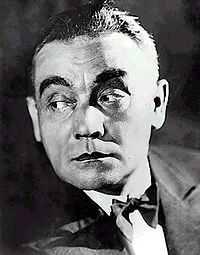Stefan Jaracz
Stefan Jaracz (born December 24, 1883 in Stare Żukowice , Austria-Hungary , today Poland ; † August 11, 1945 in Otwock , Poland) was a Polish actor in the stage and film industry and a theater director.
Life
Jaracz went to school in Tarnów, Jasło, Bochnia and finally in Kraków. In the latter city he studied law, art history and literature at the Jagiellonian University , but dropped out of the courses prematurely to concentrate entirely on theater acting. Jaracz went to Posen, where he received his draft notice from the Austro-Hungarian Army in 1907. From 1908 to 1911 he appeared in the theater in Łódź. The following year he moved to Warsaw, at that time still under Russian rule. There Jaracz continued his stage work at Teatr Mały and Teatr Polski (1913) and also made his film debut. In 1915 Jaracz was taken prisoner by Russia and came to Moscow for the first time as a result. After Poland regained its independence, Stefan Jaracz returned to his old homeland in 1918. There he concentrated entirely on stage work and was heavily involved in the field of experimental theater. Jaracz went on tour tours until 1928, visiting around 90 cities. In 1930 he took over the management of the Warsaw Ateneum Theater and returned to the camera during the transition from silent to sound film. Until 1936 he was seen in a number of productions, which were rarely shown outside of Poland. The occupation of his homeland by Hitler's Wehrmacht in 1939 abruptly interrupted Stefans Jaracz's stage work.
When the Austrian film actor and Gestapo informant Igo Sym, who lived in Poland, was murdered by Polish underground fighters in his apartment on March 7, 1941 , this was to have dramatic consequences for Stefan Jaracz as well. He was arrested along with a few colleagues and sent to the notorious Pawiak prison. In retaliation, he and over 1,000 other hostages were deported on behalf of SiPo and SD, including colleagues Bronisław Dardziński , Tadeusz Kański , Zbigniew Sawan and Leon Schiller , with whom Jaracz jointly ran the Ateneum in the 1932/33 season April 1941 temporarily in the concentration camp Auschwitz . After only a few weeks, on May 15, 1941, Jaracz was released again. Jaracz barely survived the liberation of his homeland, a looming post-war career was prevented by his rapidly deteriorating health, which led to his imminent death a few months after the end of the war. In honor of the artist, a venue in Łódź was renamed the Stefan Jaracz Theater after his death, and the Ateneum in Warsaw has also been named after its long-time director since 1951.
Movies
- 1912: Oblakany. Dramat w Tworkach (short film)
- 1913: Wykolejeni
- 1913: Obrona Częstochowy
- 1914: Bóg wojny
- 1921: Cud nad Wisłą
- 1923: Niewolnica milosci
- 1924: Skrzydlaty zwyciezca
- 1924: Śmierć za życie. Symfonia ludzkości
- 1928: Pan Tadeusz
- 1928: Przedwiośnie
- 1929: Ponad rose
- 1930: Uroda zycia
- 1932: Księżna Łowicka
- 1932: Bezimienni bohaterowie
- 1934: Młody Las
- 1934: Kocha, lubi, szanuje
- 1935: Milosc maturzystki
- 1936: Pan Twardowski
- 1936: Róża
- 1936: His great love (Jego wielka miłość)
Individual evidence
- ↑ Transport list
- ^ Transport on yadvashem.org
literature
- Kay Less : Between the stage and the barracks. Lexicon of persecuted theater, film and music artists from 1933 to 1945 . With a foreword by Paul Spiegel . Metropol, Berlin 2008, ISBN 978-3-938690-10-9 , p. 394
Web links
- Biography Stefan Jaracz on culture.pl
- Stefan Jaracz in the Internet Movie Database (English)
| personal data | |
|---|---|
| SURNAME | Jaracz, Stefan |
| BRIEF DESCRIPTION | Polish theater and film actor and theater director |
| DATE OF BIRTH | December 24, 1883 |
| PLACE OF BIRTH | Stare Żukowice , Austria-Hungary , now Poland |
| DATE OF DEATH | August 11, 1945 |
| Place of death | Otwock , Poland |
